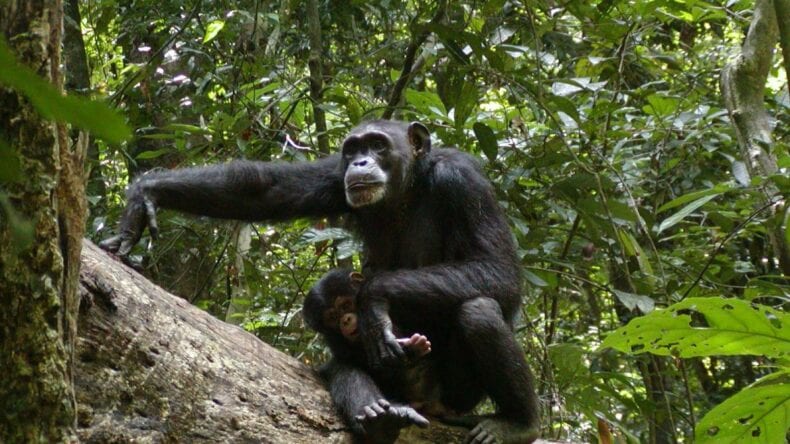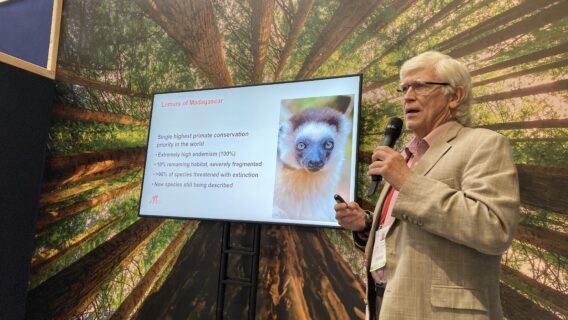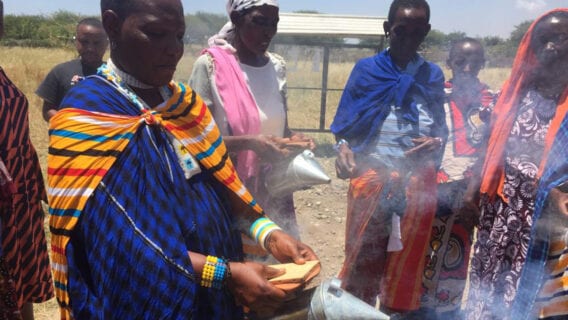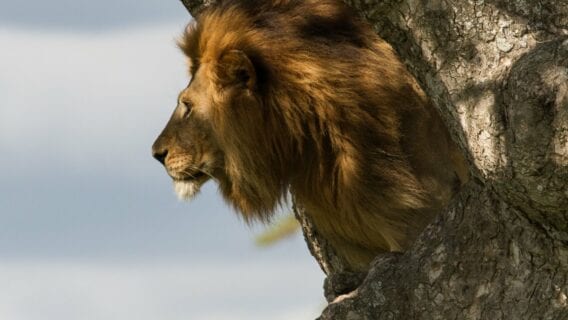New National Parks for Guinea Bissau

IUCN Save Our Species applauds #SpeciesSavers Foundation Chimbo and all its partners on their great and inspiring work to create two new National Parks in Guinea Bissau, West Africa. Home to a rich flora and fauna, including hundreds of Critically Endangered Western Chimpanzees, the Parks’ flagship species. The new sanctuaries are a very welcome and timely development, as chimpanzee populations across Africa are under significant pressure.
Chimpanzees, our closest living relatives, are currently still the most common of the great apes, but nevertheless they are at risk of extinction. Chimpanzees range from Southwest Africa through Central Africa to north-western Tanzania, divided over four subspecies, of which the most common – the Eastern Chimpanzee – has between 181,000 and 256,000 individuals, and the least abundant – the Nigeria-Cameroon Chimpanzee – only between 6,000 and 9,000.
Chimpanzees are listed under Appendix I of CITES, meaning that all commercial international trade in chimpanzees is prohibited, and as a Class A protected species under the 2003 African Convention for the Conservation of Nature and Natural Resources (revised), calling for maximal protection.
Nevertheless, chimpanzees continue to be at risk from poaching – both for so-called “bushmeat”, for traditional medicine, and, in the case of infants, for the illegal pet trade; retaliatory killing by farmers who wish to protect their crops; habitat loss and degradation caused by deforestation for agriculture and mining; and infectious diseases, such as ebola, human respiratory disease, and anthrax. Climate Change, which is expected to result in reduced rainfall in many parts of Africa, is also a possible risk. These threats have already led to the extinction of chimpanzees from three countries – Togo, Burkina Faso, and Benin – of the 24 in which they originally occurred.
Guinea-Bissau is a small tropical country on West Africa’s Atlantic coast, well-known for its extensive national parks and wildlife on both land and sea, including the world-famous Bijagós Archipelago Biosphere Reserve. It is the westernmost country where chimpanzees live: specifically, the Western Chimpanzee, of which a total estimated number of 18,000 – 65,000 individuals remain throughout south-western Africa. As the number of Western Chimpanzees has dropped by over 80% over the past 70 years – corresponding to three generations of chimpanzees – the subspecies is classified as Critically Endangered on the IUCN Red List of Threatened Species™.
But now there is some good news for the 1,000 to 1,500 Western Chimpanzees living in the south eastern part of Guinea Bissau: on 28 of June 2017, with a publication in the official Government Journal, the Government of Guinea Bissau officially created the National Parks Boé and Dulombi in the south-eastern part of the country, including large chimpanzee range areas. At the same time, three corridors were established that connect these two parks to the network of protected areas in the coastal zone of the country. Both Boé and Dulombi National Park boast a rich flora and fauna.
“The national protected areas system now covers 26.3% of the national territory, representing 12.4% of marine protected areas and 13.9% of terrestrial protected areas, which is by and large compliant with the Aichi Targets [of the Strategic Plan for Biodiversity adopted in 2010 by the international Convention on Biological Diversity],” states the Institute for Biodiversity and Protected Areas (IBAP) of the Government of Guinea Bissau.
An important partner in the creation of the new National Parks was the Dutch NGO Chimbo Foundation, dedicated to the conservation of Western Chimpanzees and their habitat, as well as its Guinea-Bissauan sister organisation Daridibó. Chimbo has been a grantee of IUCN’s Save Our Species, which has helped to fund Chimbo’s long-running intensive community-based programme to protect chimpanzees in the Boé area through research, lobbying, surveying and monitoring of populations, an education awareness campaign about chimpanzees and other primates among local people, the promotion of eco-tourism, and the original development of a management plan for the area (including micro-projects), which has now culminated in the creation of the new National Parks. A key element of Chimbo’s conservation strategy, with proven success, have been the so-called “Village Vigilance Committees” consisting of local women and men who patrol their village territory, monitor the presence of chimpanzees, report on poaching and other illegal activities, and play an important role in raising awareness.
“Village Vigilance Committees … are our allies in awareness activities, thereby providing a barrier for the selfish greed of commercial hunters. [They] ensure permanent and effective control. The pet market for chimpanzees is not supplied anymore, and the lion has returned … Chimbo’s recent activities on sacred forests [further] stimulate cultural awareness,” says Tedros Medhin, Member of the Board of Chimbo Foundation and a member of the IUCN Commission on Ecosystem Management.
The creation of the new National Parks are a great achievement for the Government of Guinea Bissau, Chimbo Foundation, and Daridibó – confirming once more that #ConservationWorks! We at IUCN Save Our Species congratulate all parties on this important milestone, and we wish them every success for the future conservation of Guinea Bissau’s chimpanzees and other flora and fauna of Boé and Dulombi and the new corridors.
“A park on paper is just a first step, the battle is not won yet. While most of the local people are very pleased with the attention paid to Boé and Dulombi, areas that were too long neglected in the past, some individuals are not happy being confronted with restrictions the National Parks legislation puts on their former unsustainable uses of flora and fauna … Our regular feed-back of research results and implications to the local population is essential to make them proud of their environment and to stimulate them to cooperate with us,” says Dr Annemarie Goedmakers, Chairperson of Chimbo Foundation.






